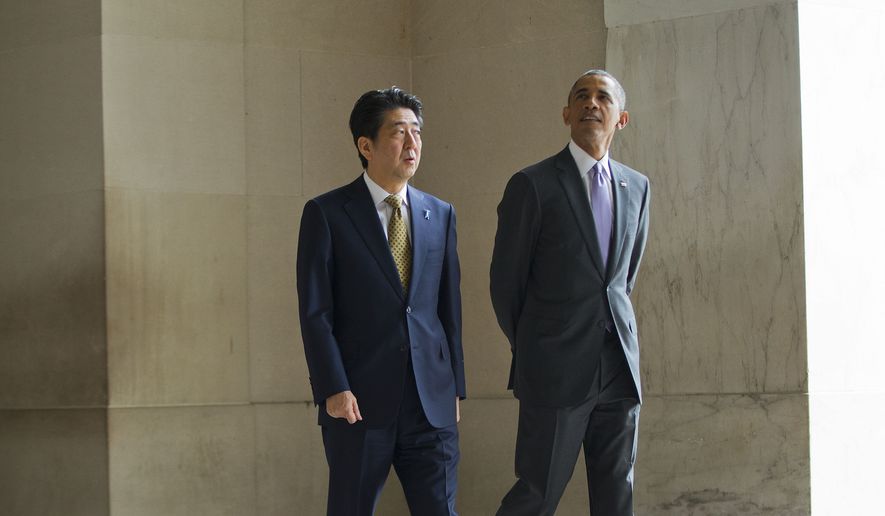OPINION:
Prime Minister Shinzo Abe of Japan will be honored Wednesday in a way that few foreign visitors are honored. He will speak to a joint session of Congress, and in an irony that will not go unremarked either here or in Japan, he will speak from the lectern used by President Franklin D. Roosevelt when he asked Congress to declare war on Japan the day after the Japanese attacked Pearl Harbor on Dec. 7, 1941, the date that FDR said “will live in infamy.”
Japan has since become a firm friend of the United States and one of it closest allies, which makes the Abe visit one of the most important state visits in years. Mr. Abe (pronounced “Ah bay”) is one of Japan’s most popular postwar leaders, in large part because of his grasp of strong leadership. He comes to his role as a quintessential product of Japan’s political culture. His grandfather, Nobusuke Kishi, was “an unindicted” war criminal who twice became a postwar prime minister. His grandson’s aggressive policy agenda, set against this background, sets him apart from his immediate lackluster predecessors. He is trying to arouse the world’s third-largest economy from a decade of torpor with an economic program that is inevitably called “Abenomics.”
Mr. Abe’s administration introduces a new era in Japanese history, and opens a fresh chapter in U.S.-Japan relations. He has set himself the difficult role of creating a “normal” Japan at home and abroad. He assumes the delicate task of persuading Japan to take responsibility for the ravages of the military leadership that led Japan to the enormously destructive war against the United States, and to do that Japan must fashion a new national ethos, abandoning the total dependency on the U.S. defense shield. Under the protection of that shield, a devastated Japan rebuilt itself and achieved prosperity and worldwide economic eminence in the half-century after the war ended in 1945. Now Japan faces immediate and longer-term challenges that are not always so clearly defined.
At home, Mr. Abe must deal with a looming demographic disaster. Japan’s population, like that of most of the industrialized nations of the West, is rapidly aging, and even more swiftly than in Europe. Japanese society is notoriously resistant to immigration; scarce chance for a remedy there. Demographic trends are notoriously fickle, but Japan’s population of 128 million could be as small as 86 million by 2060, with more than 4 in 10 Japanese over the age of 65. Japanese newspapers and television networks are awash in stories about Japanese robots performing human functions that are only the stuff of fantasy elsewhere. These robots are representative of Japan’s increasingly sophisticated industry and science. Japan ranks a solid No. 1 for the granting of patents in 2012.
Mr. Abe wants a new national role for Japan. With a rising China, which may not be a peaceful emergence as a world power, and a hostile North Korea with nuclear arms, the U.S.-Japan alliance becomes all the more crucial. He has set out to modify “the MacArthur constitution,” which until the dramatic outbreak of the Korean War, sought to transform the country into a pastoral paradise. Old memories of the militaristic past, at home as well as overseas, make that path toward “normality” crucial for his own career as well as for Japan and its relations with the United States. Washington will listen closely to the message he brings to Congress.




Please read our comment policy before commenting.